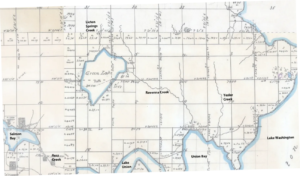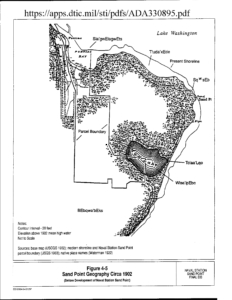FECO Land Acknowledgment – A Work-In-Progress
November 16, 2023
Thanks to Lee who, in April of 2022, kicked off the conversation about FECO’s relationship to Native American people, whose homes were on this land before European settlers arrived.
A six-member FECO Coast Salish Solidarity Group emerged and met monthly to wrestle with steps we could take to better understand the history of the Indigenous people within the Lake Washington watershed (the Duwamish, Suquamish, Snoqualmie, and Muckleshoot people) and how we might respond to what we already know.
for work parties
Please email to volunteer
freewayestatescommunityorchard@gmail
We spoke from our hearts and our minds and most of us were new to thinking about what volunteers at FECO could do, beyond a land acknowledgment, to reconcile that we were gardening on stolen land.
Over the months, we worked through several versions of a land acknowledgment, beginning with an acknowledgment fairly similar to the statements of other organizations, then working into longer and more complex statements with implications of action items. We realize that this is a work-in-progress and that our views may change. In the end, we agreed on a more succinct land acknowledgment, finalized in October of this year:
Volunteers at Freeway Estates Community Orchard (FECO) acknowledge that we are gardening in an area that is the ancestral home of Coast Salish peoples, who have lived here since time immemorial. These Indigenous people continue to live and thrive here today. We honor their continuing demonstration of respectful and reciprocal relationships with land, people, and all other forms of life and we seek to learn more about the rich Indigenous history of our area.
The process and the many discussions were rich, personal and transforming. I realize that, for many of us, fears and subconscious conflicts can cause confusion that may prevent a thoughtful consideration of historical and current events. This confusion can block us from taking steps toward a more just relationship with our Indigenous neighbors.
Writings from Indigenous authors have helped me get an idea of what it means to be place-based. The more I learn, the more I realize the extent of the damage to our neighboring Tribes. At this time, the Western colonial mindset no longer has control of my mind 100% of the time. In bits and pieces I recognize when I see the dominant viewpoint in action, in myself and in others. This, I believe, is the first step toward change.
Ruth
Possible beginning action items:
1) Purchase educational materials from nearby tribes
Stillaguamish Plant ID cards
https://www.stillaguamish.com/natural-resources/outreach-education/plant-id/
2) Purchase seeds and plants and other items from minority and Indigenous owned companies
https://ujamaaseeds.com/collections/native-americana-garden
3) Formally invite local tribes to glean at the orchard
4) Ask friends for their input on action items toward right relationships with our Indigenous neighbors
5) Start to recognize when the western colonizing mind shows up in our conversations, activities, policies, events and publications
Re-Indigenizing Ecological Consciousness and the Interconnectedness to Indigenous Identities.
Montgomery, Michelle Editor, 2022 p 69
6) Offer another FECO walk about the history of the land we are using and its watershed
7) Include a map, at our kiosk, of where Indigenous groups lived whose place was the Lake Washington drainage. Perhaps a little history also:
Coast Salish place names
https://www.burkemuseum.org/static/waterlines/images/maps-and-images/waterlines_map_medium.pdf
Cedar-Sammamish Watershed 2016
https://www.historylink.org/File/20273
Exploring lost rivers, buried creeks & disappeared streams
https://www.hiddenhydrology.org/draining-seattle-small-lakes/
Seattle Parks Department cuts down huge Ravenna Park trees in the mid-1920s
https://www.historylink.org/File/9382
The Green/Duwamish River Watershed – map
https://your.kingcounty.gov/dnrp/library/archive-documents/wlr/watersheds/green/pdf/green-river-watershed-map.pdf
Indian Lake Washington – 1984
https://s14621.pcdn.co/wp-content/uploads/2022/11/Indian_Lake_Washington.pdf
Interactive map of Native American Tribes, including Seattle
https://https://native-land.ca
8) When referring to non-human living beings, avoid words like value, resources, or eco-services when these terms imply an “us and them” framework. Alternative words might be respect, reverence, and beauty
9) Plant native and or wild food or herb plants in the garden
Friends of the trees society
https://friendsofthetrees.net/articles/1000-crops-for-northwest-growers
3 Pacific Northwest Native Plants for Easy Winter Harvests
https://www.growingwithnature.org/pnw-native-plants-easy-winter-harvest/
The Relationship between Plants and People: An Ethnobotanical Study in Partnership with the Muckleshoot Tribe – article on barriers to Native American foraging
https://digital.lib.uidaho.edu/digital/api/collection/etd/id/950/download
10) Offer to to plant native edible plants for local tribes’ ceremonial or food use
11) Add the Lushootseed translation to our native plant signs
12) If appropriate, ask for Indigenous speakers and, ask speakers if they will cover the Indigenous viewpoint on the topic
13) Continue with the historical work that Reid started to add more context and history, related to our land acknowledgment, on our website



This process has touched me deeply Ruth! Thank you!
Thank you, Ruth!
Very informative.